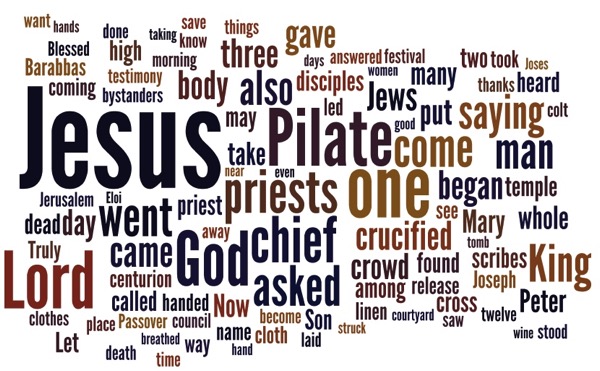Palm Sunday
A desk covered with 11 sheets of Scripture: let the preacher be befuddled, dizzied, sickened even, by the sharp contrast between two stories.
The shifting of feet, the sounds of children, whispered greetings before the blessing of palms — it is almost joyful, though a bit nervous. “Hosanna! Blessed is the one who comes in the name of the Lord!” (Mark 11:9). In ancient days, they did not quite know, nor do we, all the bitter pain appointed to the Blessed. Struggles perhaps, but always victory in the end, always triumph, always power. It is, palms held high, a happy moment, a festival. This is a story for the whole family.
| Liturgy of the Palms: Mark 11:1-11 or John 12:12-16 Ps. 118:1-2, 9-29 Liturgy of the Word: Isa. 50:4-9a • Ps. 31:9-16 |
And who, believing in Jesus, would hesitate to tell a child that Jesus could sustain the weary with only a word? (Isa. 50:4). He was so tender and good. But there is another story, hard to tell, harder still to understand. Jesus upholds the weary, and yet his back is given to blows, his cheeks to fists, his beard to pulling, his whole being to abuse and ridicule, insult and spitting (Isa. 50:5-6). To the question Why? there is no resolute answer, no single statement to settle the matter of Christ’s crushing death and his descent among the dead. It is a story and can only be felt and known as a story. Thus, we listen and enter the mind of Christ and feel, as we are able, what he felt (Phil. 2:4).
Jesus was human. So he would die as we all die. Yet we do not all die in the same way. The tears shed to grieve the end of a long and good life may be tears of both joy and sorrow. The tears to grieve a life cut short by accident or disease are a gushing torrent of agony. The wailing cries over a life abused, tortured, and murdered are enough to stop a beating heart. There is so much distress in the world, so much grieving even to death. The very thought of it can throw a man to the ground, pleading and praying that it may be otherwise (Mark 14:34-35). Every fragment of every frail human life — Jesus is. And that constitutes the gravity of his sorrow.
He was kissed not for love, but betrayal. Crowds put their hands on him. The whole council condemned him. Some spit on him, blindfolded him, and struck him. Guards took over and beat him. He was bound and led away. He was flogged almost to death, crowned with thorns, stripped, and crucified. Hanging yet alive, he was mocked and taunted. “I am forgotten like a dead man, out of mind” (Ps. 31:12). He gave a loud cry, his last breath, his body hung. This is a horrible death, yet a death remembered evermore because, in a way known only through the grace of faith, his death is every death, his sorrow all suffering, his rejection every precious life thrown to the trash. Jesus went to hell for us.
Although he did not account equality with God a thing to be grasped, he had it all the same. He took his divine nature with his human nature, and in the mystery of his one person he saved us by his suffering, gave life by his dying, broke the bars of the prison gate. The Word became flesh and dwelt among us. He was not fooling, pretending, parading; he was and is the Lord of Life in our midst. But he could bring that life to us only by entering the depth of a human hell.
Look It Up
Read Mark 15:37. He cries for you.
Think About It
Devotional verbs: poured the ointment on his head, provided for him, took down the body, wrapped him in linen cloth.
 TLC on Facebook ¶ TLC on Twitter ¶ TLC’s feed ¶ TLC’s weblog, Covenant ¶ Subscribe
TLC on Facebook ¶ TLC on Twitter ¶ TLC’s feed ¶ TLC’s weblog, Covenant ¶ Subscribe









